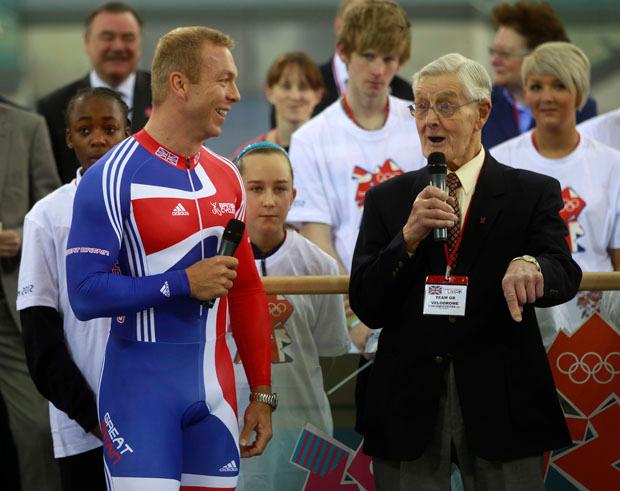Former Olympic Cyclist Tommy Godwin Remembers 1948 London Games
Britain’s cyclist Chris Hoy (left) talks with ex-Olympic cyclist Tommy Godwin. (Photo: REUTERS/Eddie Keogh)
As London and the athletes gear up for the start of the Olympics on Friday, those from another generation are remembering the last time the city played host to the games.
The year was 1948 and Britain was struggling to recover from the Second World War.
Today, only one of the venues from those games still hosts competitors, though not Olympic ones. It’s the Herne Hill velodrome in the southern reaches of London.
It’s pretty basic – no roof, so the recent rains have turned the infield into a muddy bog. The grandstand is a bit rickety too. But it still has a storied pride of place in Britain’s Olympic history.
Emerging from the dark shadow of the World War II, the 1948 Olympics were Britain’s chance to prove to the world it had triumphed over adversity. Still, the home team, marching into the stadium, faced a number of challenges. So, too, did the Games organizers, particularly when it came to preparing the cycling track.
“There was grass growing through the track center and it was in a dilapidated state,” said Wally Happy. A former competitive cyclist himself, Happy knows the history of cycling and this old velodrome well. It opened in 1891. But the war, and the army’s decision to station anti-aircraft guns on the site, left their mark.
Happy said there was only one way to ensure it would be ready for the games.
“We raised money amongst the cyclists to rebuild it,” he said. “We mortgaged our headquarters up in Central London.”
There wasn’t much money and not much food either, due to post-war rationing. So Happy says Commonwealth countries stepped in to help out.
“The Olympic team were receiving food parcels from Canada, Australia, New Zealand South Africa,” he said. “If it hadn’t been for that, nourishment for those riders would have been nil.”
Among those riders was one who’s now a legend at the Herne Hill velodrome. Tommy Godwin, now 91, recently returned to the track where he became an Olympian all those decades ago.
Godwin developed a passion for cycling after working as a delivery boy. During the war, he worked in a munitions factory, so 1948 was Godwin’s first, and possibly only chance, at Olympic glory. His father, a former athlete himself, wasn’t about to let his son fail, even if there wasn’t enough food for a cyclist in training.
“He used to give me a glass of sherry and put a fresh egg in it and drink that and then he said I would have to have a glass of Guinness to get the iron content,” Godwin said. “My father knew a lot of practical things.”
Godwin knew he’d become a real medal threat the day the Americans came calling. He’d been born in the United States, but moved to Britain as a child.
“Yes indeed, they came across to me and they said you’re American by birth. I said yes and they said would you consider changing your allegiance? I said indeed not. I said I’m very much British and that’s it.”
And so, Godwin raced under the Union Jack. He won two bronze medals, enough he said to prompt his stoic father to cry with pride.
Godwin remembers those Games and this track, and he compares it to the high-tech, high-cost flashy Olympics of today. Godwin cherishes all that 1948 brought to him — including the hardship.
“You had to take things as they come along,” Godwin said. “To be in the Olympic Games, you put heart and soul into it regardless of the failure of certain things.”
On this day, Godwin couldn’t resist. He got up on the bike, recreating his victory lap in the velodrome, and doing it in pretty good time.
For a moment, he grins like the young Olympian he used to be.
The World is an independent newsroom. We’re not funded by billionaires; instead, we rely on readers and listeners like you. As a listener, you’re a crucial part of our team and our global community. Your support is vital to running our nonprofit newsroom, and we can’t do this work without you. Will you support The World with a gift today? Donations made between now and Dec. 31 will be matched 1:1. Thanks for investing in our work!
